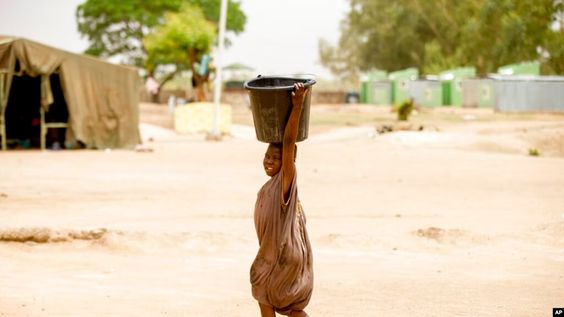Africa
Report: Conflict Fueled by Climate Change in Lake Chad Basin

According to a research released on Thursday, climate change-related droughts, flooding, and a diminishing Lake Chad are generating conflict and migration in the area and need to be adequately addressed.
Refugees International, a human rights organisation, demanded that the topic take centre stage at a high-level international conference on the Lake Chad basin that will take place next week in Niamey, the capital of Niger.
According to the report, dwindling natural resources brought on by unfavourable weather are escalating tensions between neighbours and uprooting individuals. According to the report, 3 million people have been forced to flee their homes, and an additional 11 million require humanitarian relief.
The report’s primary author, Alexandra Lamarche, told The Associated Press that “too little attention has been paid to how climate change fuels violence and displacement for too long.” The existence of armed groups has been the exclusive focus of international reactions to the Lake Chad basin situation.
Beyond only a climate catastrophe
The Lake Chad basin and the larger Sahel region have been unstable for 13 years due to an insurgency led by the extremist group Boko Haram and other militant groups. Nigeria, Niger, Chad, and Cameroon all share the basin.
Mabingue Ngom, the senior advisor to the executive director of the United Nations population office, claimed that the situation the Lake Chad region is experiencing goes “far beyond a climate and ecological disaster.” It is a humanitarian issue that affects both peace and regional growth.
The Lake Chad basin “is particularly vulnerable to climate change-related extreme events such as floods and droughts,” the United Nations weather agency warned. It also cautioned that “extreme events will likely become more abundant causing more frequent droughts and flooding with impacts on food security and general security in the region.”
Lamarche pointed out that as climate change increases, the northern Cameroonian commune of Logone Birni is especially susceptible to rising violence.
60,000 people were compelled to flee Logone Birni for asylum in neighbouring Chad by fighting over access to natural resources in late 2021, according to Lamarche.
READ ALSO: Boko Haram and ISWAP fight, leaving dozens of terrorists dead in Lake Chad
construction and additional contributing elements
According to statistics from the Lake Chad Basin Commission, the Lake Chad basin in west and central Africa makes up 8% of the African continent and is home to 42 million people who depend on farming, fishing, and pastoralism for a living.
According to the U.N. environment agency, climate change has significantly contributed to the 90% reduction in Lake Chad’s size during the past 60 years. Population growth, dam development, and irrigation were also to fault.
The “adverse implications of climate change” will reportedly be discussed as part of peace-building and humanitarian efforts, according to a preliminary summit agenda obtained by The Associated Press.
“The perfect chance for foreign funders to commit to long-term solutions to address the connection between climate change, violence, and displacement in the region,” Lamarche said of the conference.
Third high-level summit on the lake’s basin will be held in Niamey.
